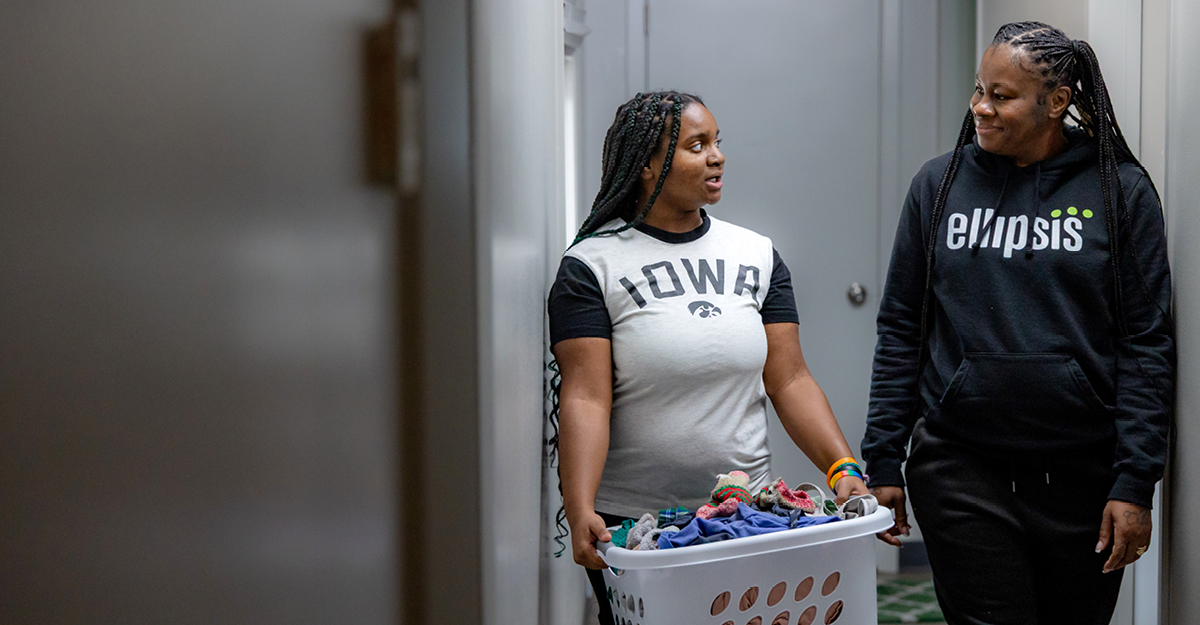Help the kids and teens in your life manage stress by decluttering their mental and physical spaces for a healthier, more balanced life.
Spring is a season of renewal — warmer weather, fresh air and the tradition of cleaning out clutter. While the focus is typically on tidying up our physical spaces, mental clutter can be just as overwhelming, especially for kids and teens. At Ellipsis, we see firsthand the effects of stress on young people, many of whom have experienced trauma, instability and significant life changes. By understanding what causes stress, how it manifests and ways to manage it; we can help our young people develop healthier coping strategies.
The weight of stress on youth at ellipsis
Many of the youth at Ellipsis have faced challenges far beyond typical childhood stressors. Ellipsis clients were asked if they had experienced any of the following adverse childhood events as part of the ACE assessment.
- Had parents who were separated or divorced
- Had someone in the household with a mental illness
- Experienced emotional abuse
- Substance abuse was present in the home
- Experienced emotional neglect
- Had a mother who was treated violently
- Experienced physical abuse
- Had a householder member who went to prison
- Experienced physical neglect
- Experienced sexual abuse
The assessment scores range from 0-10 based on how many of the 10 types of adverse experiences a person is or was exposed to as a child. The results from ACEs show dramatic links between adverse childhood experiences and risky behavior, psychological issues and serious illness. Per the National Institutes of Health, 15.8% of Americans have a score of four or more, at Ellipsis 53% of the youth we serve have a score of 4 or more.
For many of these kids, change is constant and life feels unpredictable. Some have been in and out of multiple care placements, while others are entering group care for the first time. Upon arriving at Ellipsis, they must adapt to new rules, a set schedule and the absence of familiar comforts like their cell phones.
These sudden shifts can heighten feelings of fear and uncertainty, making stress management a crucial part of their care.

Signs of stress in kids and teens
Stress doesn’t always look the same in young people. While adults may verbalize feeling "stressed out," kids and teens often express it in different ways, such as:
- Emotional outbursts: Anger, irritability or frequent mood swings
- Withdrawal: Isolation, refusing to participate in activities or shutting down
- Hyperactivity: Fidgeting, difficulty concentrating or sensory overload
- Sleep or eating changes: Difficulty sleeping, nightmares, overeating or loss of appetite
- Neglecting hygiene or responsibilities: Avoiding showers, ignoring chores or letting personal spaces become messy
Recognizing these signs early can help caregivers and parents step in with support before stress escalates.
How Ellipsis helps youth manage stress
At Ellipsis, we integrate structure, routine and coping strategies into daily life to help kids navigate their stress in a healthy way. Some key elements include:
Consistent schedules: Predictability can be calming. Our youth follow structured daily routines that include school, meals, chores and scheduled downtime.
Physical activity: Exercise is a natural stress reliever. We encourage movement through sports, walks and structured activities.
Clean and organized spaces: A clutter-free environment helps minimize sensory overload. Our youth participate in daily chores, like making their beds, folding laundry and keeping personal spaces tidy, reinforcing the connection between physical space and mental clarity.
Quiet time and downtime: Moments of calm are built into each day, allowing kids to read, reflect or simply take a break from stimulation.
Therapy and personalized support: Each child has a treatment plan tailored to their experiences, with access to therapists, case workers, and staff who provide emotional guidance and coping tools.
Decluttering stress at home: Tips for parents
Stress is a universal experience and the strategies we use at Ellipsis can also benefit kids and teens at home. Here are six simple ways parents can help their kids declutter stress and create a sense of balance.
- Establish a routine and strive for predictability.
Consistency can be reassuring, even in small ways. Set regular mealtimes, bedtime routines and daily responsibilities to give kids a sense of stability. - Encourage small acts of organization.
Cleaning an entire room can feel overwhelming, but small tasks like making the bed, picking up toys or organizing a backpack can provide a sense of accomplishment. Setting a timer for a small amount of time, like five or 10 minutes can also allow them to stay focused and see what they can accomplish. - Prioritize physical activity and fresh air.
Movement is a great way to reset the mind. Encourage outdoor play, walks or a few minutes of stretching. - Create tech-free downtime.
Set aside time without screens for the whole family to encourage relaxation, whether it’s reading, drawing or simply unwinding before bed. - Model and teach coping strategies.
Show your child how to manage stress by practicing mindfulness, deep breathing, doing a fun activity or journaling together. - Validate their feelings.
Let kids know it’s okay to feel stressed and create a safe space for them to talk about what’s bothering them.
Start fresh this spring
By recognizing stress, providing support and creating healthy habits, we can help young people manage life’s challenges in a positive way now to improve how they manage stressors as adults. Spring is the perfect time to reset any current routines or to try something new to help with stress. Whether at Ellipsis or in your own home, small steps can lead to big changes in stress management and emotional well-being.
